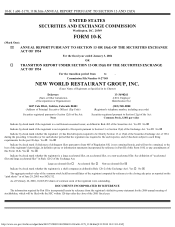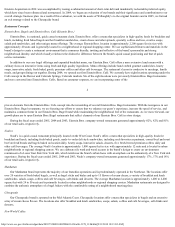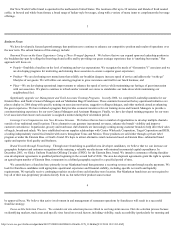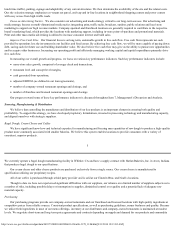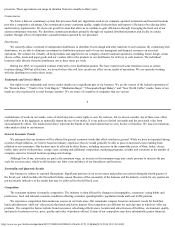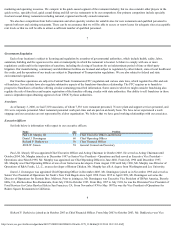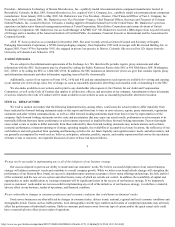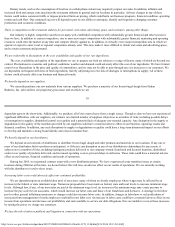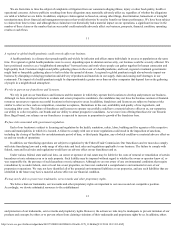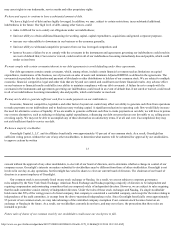Einstein Bros 2005 Annual Report Download - page 11
Download and view the complete annual report
Please find page 11 of the 2005 Einstein Bros annual report below. You can navigate through the pages in the report by either clicking on the pages listed below, or by using the keyword search tool below to find specific information within the annual report.
http://www.sec.gov/Archives/edgar/data/949373/000110465906016136/a06-3178_110k.htm[9/11/2014 10:13:03 AM]
may assert rights in our trademarks, service marks and other proprietary rights.
We have and expect to continue to have a substantial amount of debt.
We have a high level of debt and are highly leveraged. In addition, we may, subject to certain restrictions, incur substantial additional
indebtedness in the future. Our high level of debt, among other factors, could:
· make it difficult for us to satisfy our obligations under our indebtedness;
· limit our ability to obtain additional financing for working capital, capital expenditures, acquisitions and general corporate purposes;
· increase our vulnerability to downturns in our business or the economy generally;
· limit our ability to withstand competitive pressures from our less leveraged competitors; and
· harm us because a failure by us to comply with the covenants in the instruments and agreements governing our indebtedness could result in
an event of default that, if not cured or waived, could result in all of our indebtedness becoming immediately due and payable, which could
render us insolvent.
We must comply with certain covenants inherent in our debt agreements to avoid defaulting under those agreements.
Our debt agreements contain certain covenants, which, among others, include certain financial covenants such as limitations on capital
expenditures, maintenance of the business, use of proceeds on sales of assets and minimum Adjusted EBITDA as defined in the agreements. The
covenants also preclude the declaration and payment of dividends or other distributions to holders of our common stock. We are subject to multiple
economic, financial, competitive, legal and other risks that are beyond our control and could harm our future financial results. Any adverse effect
on our business or financial results could affect our ability to maintain compliance with our debt covenants. A failure by us to comply with the
covenants in the instruments and agreements governing our indebtedness could result in an event of default that, if not cured or waived, could result
in all of our indebtedness becoming immediately due and payable, which could render us insolvent.
We may not be able to generate sufficient cash flow to make payments on our indebtedness.
Economic, financial, competitive, legislative and other factors beyond our control may affect our ability to generate cash flow from operations
to make payments on our indebtedness and to fund necessary working capital. A significant reduction in operating cash flow would likely increase
the need for alternative sources of liquidity. If we are unable to generate sufficient cash flow to make payments on our debt, we will have to pursue
one or more alternatives, such as reducing or delaying capital expenditures, refinancing our debt on terms that are not favorable to us, selling assets
or raising equity. We may not be able to accomplish any of these alternatives on satisfactory terms, if at all, and even if accomplished, they may
not yield sufficient funds to service our debt.
We have a majority stockholder.
Greenlight Capital, L.L.C. and its affiliates beneficially own approximately 95 percent of our common stock. As a result, Greenlight has
sufficient voting power, without the vote of any other stockholders, to determine what matters will be submitted for approval by our stockholders,
to approve actions by written
13
consent without the approval of any other stockholders, to elect all of our board of directors, and to determine whether a change in control of our
company occurs. Greenlight’ s interests on matters submitted to stockholders may be different from those of other stockholders. Greenlight is not
involved in our day-to-day operations, but Greenlight has voted its shares to elect our current board of directors. The chairman of our board of
directors is a current employee of Greenlight.
Our common stock is not currently listed on any stock exchange or Nasdaq. As a result, we are not subject to corporate governance
rules adopted by the New York Stock Exchange, American Stock Exchange and Nasdaq requiring a majority of directors to be independent and
requiring compensation and nominating committees that are composed solely of independent directors. However, we are subject to rules requiring
that the audit committee consist entirely of independent directors. Under the rules of these stock exchanges and Nasdaq, if a single stockholder
holds more that 50% of the voting power of a listed company, that company is considered a controlled company, and except for the rules relating to
independence of the audit committee, is exempt from the above-mentioned independence rules. Since Greenlight beneficially owns approximately
95 percent of our common stock, we may take advantage of the controlled company exemption if our common stock becomes listed on an
exchange or Nasdaq in the future. As a result, our stockholders currently do not have, and may never have, the protections that these rules are
intended to provide.
Future sales of shares of our common stock by our stockholders could cause our stock price to fall.

